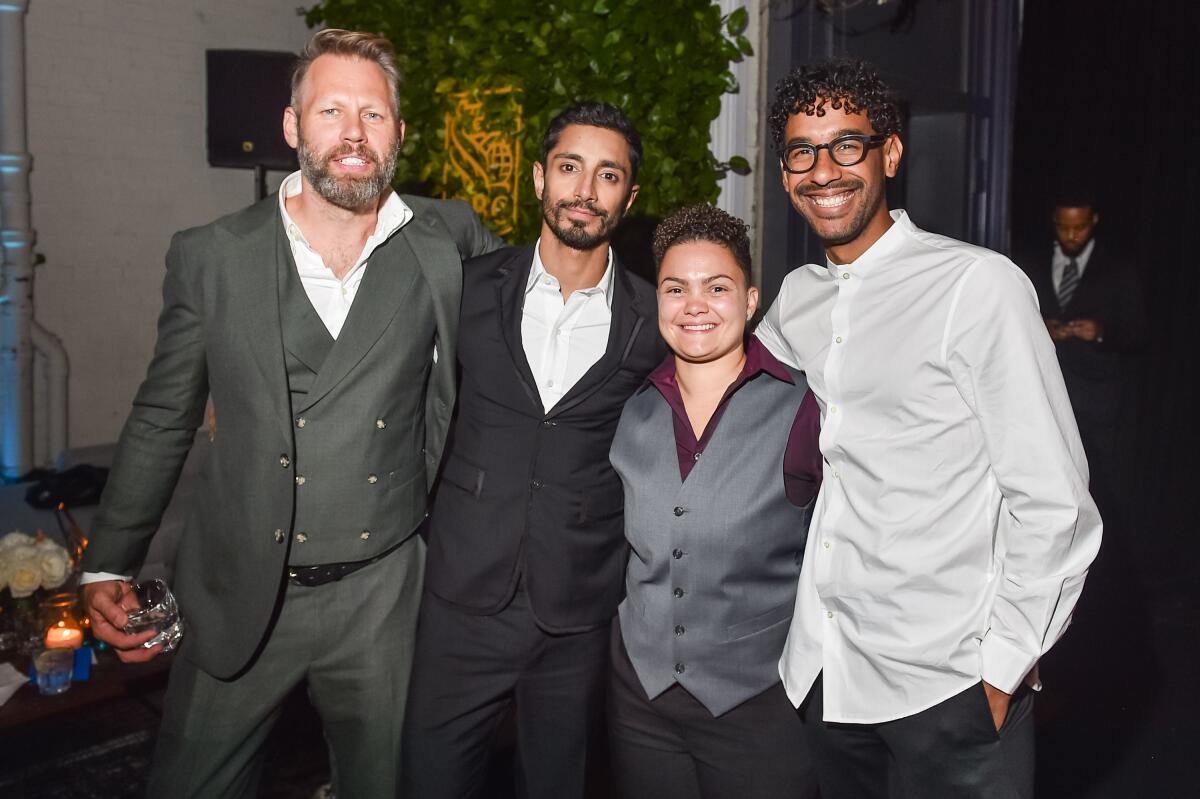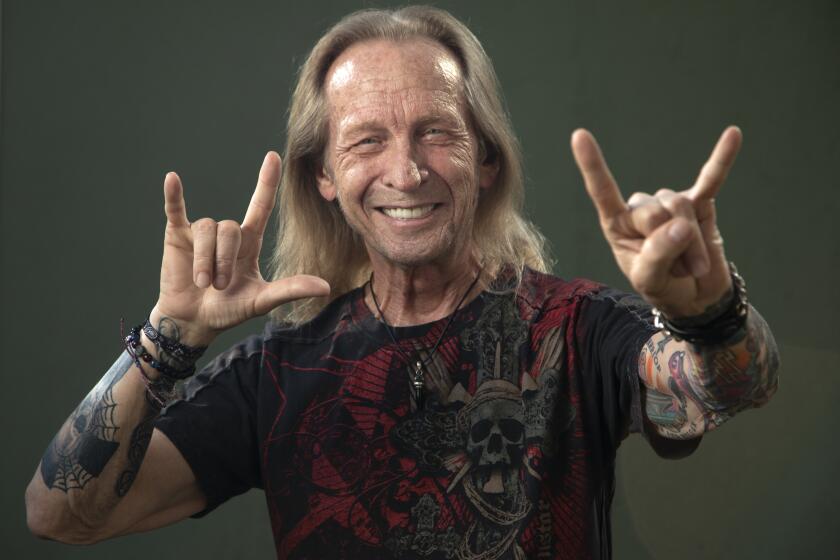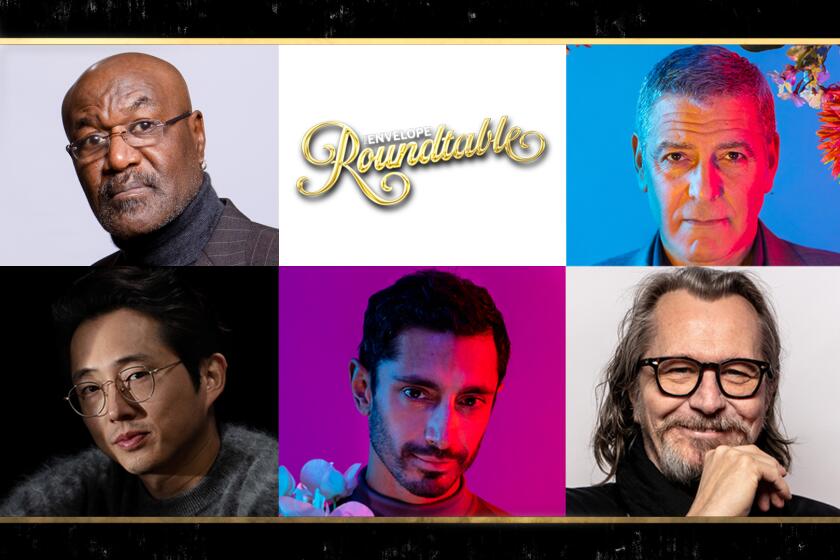Thanks to its Deaf actors, ‘Sound of Metal’ offers an authentic look at Deaf culture
- Share via
When actor and American Sign Language coach Jeremy Lee Stone instructed costar Riz Ahmed to stop using his voice on the set of “Sound of Metal,” Ahmed did something strange.
Instead of copy-signing Stone — or reflecting the sign back to his ASL teacher as expected — Ahmed looked away, nodded and with his voice said, “OK,” forcing Stone to repeat himself by twisting his hand and fingers front of his neck.
The command, which means “turn your voice off,” is a common call-and-response sign used when teaching ASL. And after training extensively with Stone, Ahmed knew better than to ignore it. Stone was perplexed and frustrated by the actor’s behavior.
“I was really shocked by that,” Stone says during a recent Zoom interview. “I’ve taught him for seven months. Why is he not doing this?”
The cameras were rolling during the brief, improvised exchange between Ahmed and Stone, who agreed to appear in “Sound of Metal” as an ASL teacher after director Darius Marder insisted on using his talents on-screen as well as behind the scenes. Stone is one of multiple Deaf artists who offered their own perspectives during production to ensure that the film’s Deaf community was represented authentically.
“Later on, Riz comes over to me, and he said, ‘I just felt like I had to refuse you in that moment because I’m not comfortable. I wasn’t ready to turn off my voice,’” Stone says. “And in that moment ... I’m understanding that this is an acting choice that Riz was making.
“It absolutely parallels real experiences that I have with teaching ASL. People aren’t comfortable. They feel strange. It’s a struggle — hard to get in their bodies and to understand. And then it becomes easier.”
What was an out-of-character moment for Ahmed, who had recently immersed himself in Deaf culture for his latest star turn, made sense for Ahmed’s character, Ruben, a heavy-metal drummer who loses his hearing in the Amazon drama.
As Ruben’s hearing rapidly deteriorates, he reluctantly joins a Deaf community — a diverse ensemble of characters mostly played by Deaf actors, with the exception of Ahmed and Paul Raci, a child of Deaf adults who portrays Joe, the leader of the community.
“I’m so happy to see how this film really represents part of the Deaf community, as well as part of hearing loss and that community and the journey through that,” Stone says while Zooming from Pasadena.
“I was amazed at how often I got to see Deaf actors. There were a solid amount of Deaf actors in this film. That is so rare. ... The last time I saw a project that included — man, I’m trying to think...”
He trailed off, unable to come up with a single example spotlighting as many Deaf performers.
“Hopefully the expectation will be more [representation],” he adds. “And not just Deaf, but Deaf-Blind, diverse BIPOC members of the community, LGBTQ. To see that represented on-screen was just so powerful.”
Darius Marder’s drama is an uncommonly nuanced portrait of a young man entering a Deaf community.
One of the most prominent Deaf characters in the film is Jenn, a recovering addict and Ruben’s best friend in the community played by Chelsea Lee. Her casting, as Lee describes it, was “kismet” — both because of her uncanny resemblance to the character and because she just happened to live in Boston at the time auditions were held in the city.
“[Marder] had a version of Jenn that actually sort of just went along the lines of who I am,” Lee says over Zoom from Denver. “I’m Deaf. I’m queer. I grew up in a Deaf community. ... But the biggest difference was that I had never experienced addiction.
“I think addiction itself is an identity for folks, and we all have so many identities within our intersectional selves. And for me, as a Deaf person, I have experienced rejection, and I have experienced marginalization. ... So I imagined that somebody who experienced life as an addict would probably feel those marginalizations.”
While preparing for her big screen debut, Lee met with Marder to develop a backstory for her character. They determined that Jenn grew up feeling isolated from her hearing family before the events of the film. In “Sound of Metal,” Ruben fills a void left by Jenn’s estranged brother.
“She felt as though the experience of losing the relationship with her brother really sort of [led to her becoming] codependent on Ruben,” Lee says. “She would do anything for Ruben.”
Jenn’s past trauma is never fully unpacked in “Sound of Metal,” but it does inform a pivotal scene in which Lee’s character is hesitant to help Ruben sell his music equipment to raise money for cochlear implant surgery, which he hopes will restore his hearing.
“I think that goes back to Jenn’s backstory — not trusting hearing folks,” Lee says. “At the time, Ruben was still a hearing guy [on the inside]. ... Is he trustworthy? Is he going to take advantage of me? And then also wanting to give him the benefit of the doubt, because Jenn really cares about Ruben.”
The 72-year-old journeyman actor is himself the child of deaf parents. He added some of his own experiences to the script.
Lee says the profound relationship Jenn forges with Ruben was reflected off-screen in her close bond with Ahmed, who connected with his scene partner “as a person, not just as an actor,” and would sometimes ask her for sign language advice. At one point, the pair even created an original sign together for a scene that didn’t end up making the final cut.
Both Ahmed and Marder welcomed feedback from the film’s Deaf cast — especially from Stone, who was recruited as an ASL coach but ended up becoming much more involved as a consultant. Often, Marder would allow Stone to completely take over for him on set, to the point where the filmmaker’s own crew approached him and asked, in earnest, if he was comfortable with Stone leading the production.
“It’s immeasurable, the effect that Jeremy had on this movie,” Marder says via Zoom. “I leaned on him for a lot, and then I realized when I was shooting, I wanted a Deaf director with me. ... I wanted the Deaf community to represent themselves in this film. I didn’t want to be representing that culture myself, of course, because how can I?”
Stone, who last month signed with M88, a new agency that represents Michael B. Jordan and aims to diversify Hollywood, felt compelled to step in whenever a sequence rang false to him during filming. When characters communicating via ASL were staged too close together, Stone made sure that they were given ample space to sign without colliding. When Deaf actors were directed to appear shocked as another person entered the frame, Stone explained that Deaf people typically stand at an angle “so that we can see if people are coming and going.”
And while shooting a scene in which Ruben watches a video of his girlfriend singing on Joe’s computer, Stone informed Marder that Deaf people tend to keep their electronics on mute. In the movie, the clip is played without sound.
“I’m trying to think of another example where Jeremy ... really called me out on something,” Marder says. “They happened every day. ... I really asked for it.”
Riz Ahmed, George Clooney, Delroy Lindo, Gary Oldman and Steven Yeun take us inside their new films and open up about their insecurities.
By the time production began, Ahmed had become so skilled in and familiar with ASL that Stone had to remind him that his character was not supposed to be fluent. While filming Ruben’s first Alcoholics Anonymous meeting, for example, Stone noticed Ahmed focusing intently on his fellow performers as they signed their introductions. He pulled Ahmed aside between takes to point out that Ruben would have no idea how to process sign language on his first day.
“It allowed me the responsibility to convey more about the Deaf community, to make sure ... that the culture was represented appropriately,” Stone says of working with Marder and Ahmed.
“I felt very comfortable having that discussion with them to make sure we stayed on the right track.”
Supervising sound editor Nicolas Becker takes viewers on an aural journey that leaves us feeling what it’s like to lose our hearing.
Some of the most authentic set pieces in the film, according to Stone and Lee, were the dinner scenes in which the AA group members share food, conversation and laughter at a round table. The circular shape of the table was key, as the actors needed direct lines of sight to each other to communicate — which they did by enthusiastically signing every which way and thumping on the table to alert others when they had something to say.
Watching the supper sequences back, Lee was reminded of her own family members, who were often seen as loud and “animalistic” by hearing patrons at restaurants when sharing meals in public.
“[T]o experience this rejection and [feel] like we had to hide our identity because folks didn’t know that that was the norm for Deaf folks, was really intriguing,” Lee says.
“To see it on-screen [is] to understand that Deaf people have a culture. Deaf people have a language, and we are not animals. ... We have this beautiful language through which we communicate, and it was just seen as a normal conversation [in the film].”
Asked what came up in their normal conversation, Lee couldn’t help but grin as she recalled one particularly candid dinner-table discussion about someone who forgot to flush the toilet earlier that day. (In the movie, the unscripted dining scenes are not subtitled for hearing audiences until Ruben can comprehend ASL.)
“We’re very descriptive,” Lee says. “You can imagine, like, ‘Who left the one that looks like the poop-emoji swirl? Who left the one that looks like they had lasagna for dinner?’ It was pretty funny.”
With the critical success of “Sound of Metal,” Lee and Stone are hopeful that more opportunities will arise for Deaf and other marginalized creatives in the entertainment industry — both behind and in front of the camera.
With an Indie Spirit and SAG Award-nominated project on her resume, Lee expresses a desire to continue her acting career — as does Stone, who also wants to direct his own projects with the goal of blazing a trail for Deaf talent while breaking down “barriers between the Deaf community and the entertainment industry.”

“If a script writes a Deaf character, and there’s a hearing person that’s cast in that role ... it’s a strange situation, because now this hearing person is deciding, ‘OK, I’ll take this role, and now I’ll learn American Sign Language,’” Stone says.
“But why not just simplify it and hire a Deaf actor? You don’t have to go through that whole expense and the process of learning a language. That just boggles my mind.” (He later adds that Ahmed’s casting worked for “Sound of Metal,” namely because Ruben was not written as a Deaf character.)
As the rallying cry “Nothing about us without us” continues to gain traction in representation discourse, Lee and Stone believe “Sound of Metal” is a testament to the power of listening to the people off-screen whose stories are being told on-screen.
“When we had finished filming, and everybody said cut, I burst into tears,” Lee says. “It’s rare to have this kind of experience where your lived experience is so welcomed ... and that is a moment I will remember for the rest of my life.”
More to Read
Only good movies
Get the Indie Focus newsletter, Mark Olsen's weekly guide to the world of cinema.
You may occasionally receive promotional content from the Los Angeles Times.













